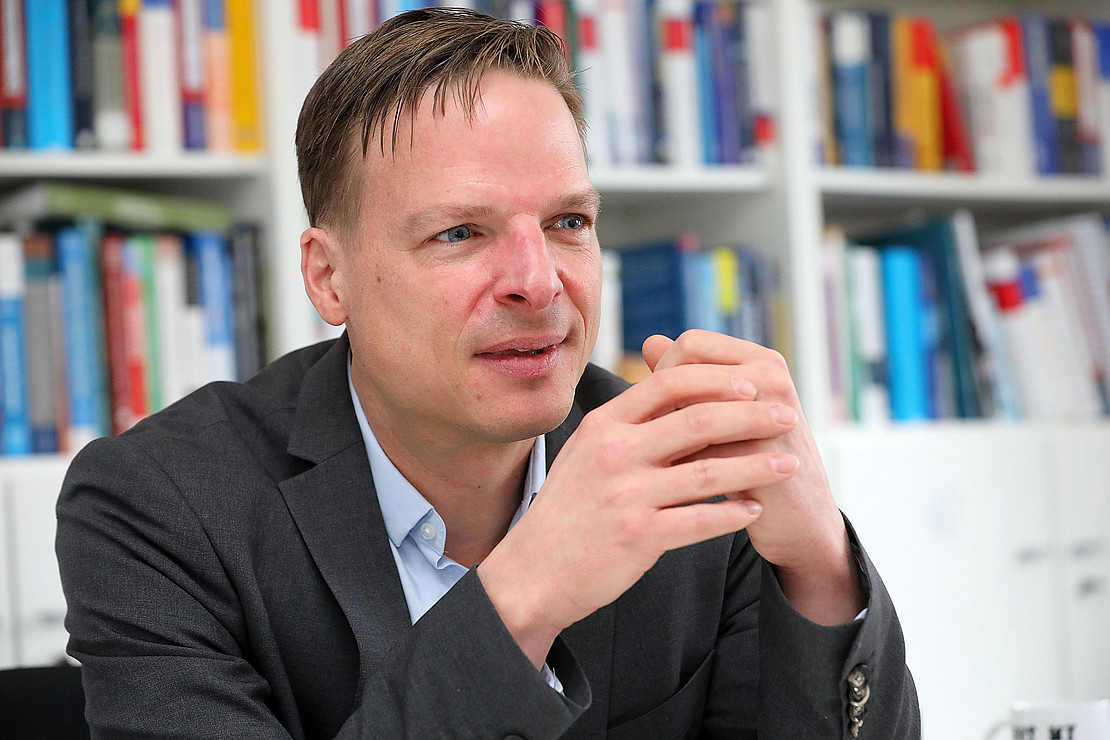This page contains automatically translated content.
"Climate change has become a business risk"
 Image: Andreas Fischer
Image: Andreas FischerProf. Dr. Christian Klein heads the Department of Corporate Finance and is one of Germany's leading experts on sustainable finance. Klein is a member of the German government's Sustainable Finance Advisory Board and the Sustainable Finance Science Platform. The topic plays a major role in his courses; since the winter semester, he has been collaborating on this with the Evangelische Bank in Kassel, among others.
Mr. Klein, if I want to invest 1,000 euros with a clear conscience, what would you advise me to do?
It depends on what you want. A lot of funds advertise sustainability; find out exactly what's in it. If that's too much work for you, there are now quite good seals of approval, for example from the Forum Nachhaltige Geldanlagen FNG. What's exciting is that some banks now guarantee that they will do something decent with the money in your savings account or fixed-term deposit account.
There is a lot of movement on the subject of investment. The EU Commission has started to define what sustainable means. This leads to a huge positive list. In the future, a fund will say that it is 73 percent or 82 percent sustainable. I think that's good. Incidentally, I expect that the states will soon make certain subsidies for companies dependent on the same criteria.
Does sustainable investing pay off financially? Or do I have to think of it as a kind of donation?
We have investigated this in a broad-based study. The result: Sustainable funds have performed at least as well as others in recent years. Some better. In my estimation, this is because certain risk factors are excluded. A company that is managed in a socially sustainable manner will most likely not be involved in a child labor scandal that threatens its existence.
Even the world's largest asset manager Blackrock now wants to make sustainability a key investment criterion....
Climate change has become a business risk. Take the oil companies: half of their known oil reserves are already on their balance sheets as assets. But under the Paris climate accords, we are only allowed to consume a maximum of a quarter of all reserves. If the world takes this seriously, these companies will have to write off the other quarter.
So capitalism internalizes saving the world?
If the right framework conditions are set for it. And also enforces them.
You sound optimistic that it will succeed....
Yes, I am an optimist. We can't expect banks and companies to come up with the idea of saving the world on their own. But with the right regulation, it can work. A lot has been happening in the last few years. I notice it in my day-to-day work: We constantly get requests for cooperation, from ministries, from banks, even from auditing agencies that want us to advise them.
We also can't meet the challenges without the financial markets. According to estimates, climate change and climate adaptation in Europe will cost 180 billion to 260 billion euros every year. You can't finance that through taxes alone.
You are one of the few economists in Germany who have been working on sustainability for a long time. Has your guild been asleep?
Many of my finance colleagues at other universities haven't taken the topic seriously for a long time. I also like being at the University of Kassel because there are many here who have been thinking about the topic for a long time.
And the banks? Have they also been asleep?
There are commendable exceptions, such as some savings banks. But a large proportion of bank executives thought they could sit the issue out. Original quote from a board member: We've seen a lot come and go.
Interview: Sebastian Mense